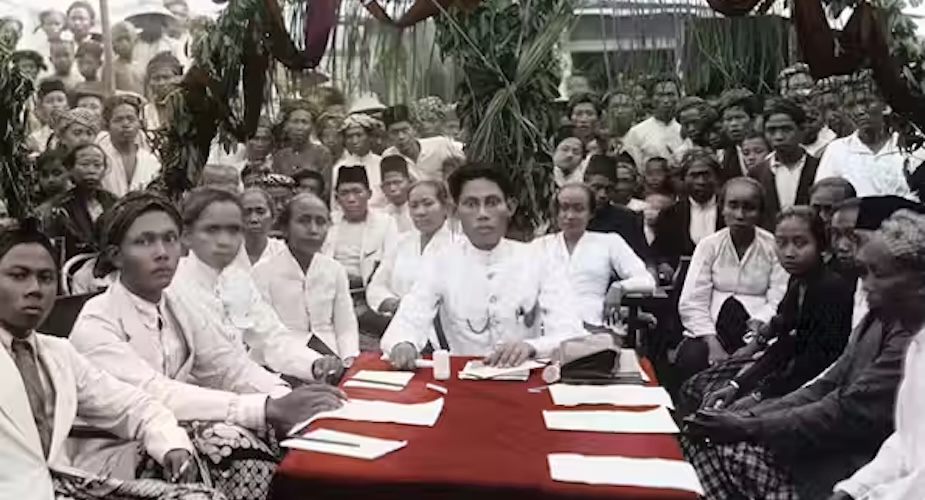Some Christian and Muslim leaders view the new Ministerial Decree on Houses of Worship as restrictive.
Ismatu Ropi
On 21 March 2006, a new Joint Ministerial Decree on Houses of Worship was issued by the Minister of Religion and the Minister of Internal Affairs (No. 9 of 2006 and No. 8 of 2006, respectively — see box for main features). The decree sets out stricter requirements for building houses of worship. For over two years before its enactment, the draft of the decree was hotly debated by civil society groups. Despite the stated aim of this decree, there are differing views on whether it will assist in fostering religious harmony.
Revision of past laws
The 2006 regulation is a revision of the 1969 Joint Ministerial Decree on the Construction of Houses of Worship issued by the Ministry of Religion and the Ministry of Internal Affairs. The 1969 decree gave much power to local authorities ‘to guide and supervise so that religious mission would not divide the community’. It stipulated that ‘a house of worship may only be built with the approval of a regional administrator such as the provincial governor.’ Only if it was necessary would the local authorities consult with local religious leaders.
A 1975 telegram from the Minister of Internal Affairs to all provincial governments prohibited the use of private homes for religious services, further restricting freedom.
The greater responsibility for administering houses of worship given to provincial governments under the 1969 decree led a number of regional authorities to issue additional, more specific, regulations. Two decrees issued by the governor of Jakarta in 1979, for instance, stipulated that any request for building a house of worship should include a list of the members of the congregation who would use the building. Houses of worship were also required to fulfil other conditions, such as being a specific distance from other houses of worship and from places of entertainment and recreation.
Elsewhere, the requirements were even more stringent. A 1983 circular from the Central Java Office of the Ministry of Religion required proof that at least 90 families in a village would attend the house of worship before the license for building was given.
Taken together, the laws limited the possible locations and size of congregations and enabled the state to access information about the members of religious congregations. Moreover, the administrative procedures required by the laws meant that it could take many years to obtain a licence to build a place of worship.
Appeals for revision of the 1969 decree argued that the decree, with the ensuing procedural delays, violated the basic human right of freedom of religion. No group took the state to court for fear of military reprisals.
Some religious leaders, especially Christians, who found it particularly difficult to get building approvals in a timely fashion, challenged the decree and began using private homes for religious services. As a result, they faced charges of breaking the law as well as strong opposition from other local religious leaders, who accused them of disrespecting religious sensitivity. In addition, mobs took action into their own hands, destroying more than 374 churches by 1997. This figure might have doubled by now.
In the post-Suharto era, a number of both Christian and Muslim leaders complained that the policy on houses of worship had triggered prejudice and led to socio-religious conflicts in the community. Initiatives to annul or at least to revise the policy gained momentum in 2004, when the new government initiated community discussion of a new draft decree. However, despite revisions, many religious leaders feel that the final decree does not fulfil their expectations.
Responses by religious groups
Religious groups, and even members of parliament, have criticised the new decree as superficial, and have questioned whether it will be effective in practice. Many are concerned that the decree might result in more prejudice and horizontal conflict: for decades, the issue of houses of worship has been a significant area of conflict between Christian and Muslim communities. Other religious leaders feel that a number of articles in the decree are problematic or too vague. Article 13(1), for example, states that the construction of a place of worship must be based on ‘clear and genuine need’, yet leaves unclear who would make the decision about what constitutes ‘clear and genuine need’.
Weinata Sairin, chairperson of the PGI (Fellowship of Christian Churches of Indonesia), has commented that the freedom to worship is set out in the Constitution, and the number of worshippers in a congregation is unimportant.
Franz Magnis-Suseno, a prominent Indonesian Catholic scholar, also voiced his concerns, commenting that ‘there is a danger that members of the local majority community who give written approval to a minority request to build a house of worship could be intimidated.’
Some Muslim leaders have also criticised the decree. Hasyim Muzadi, chairperson of Nahdlatul Ulama (NU), Indonesia’s largest Muslim organisation, sees the 2006 decree as more restrictive than the 1969 regulation. NU, PGI and MAWI (High Council of Indonesian Bishops) released a joint statement asking national and provincial governments to implement the new policy fairly. Prior to the decree being signed, many young Muslims demonstrated against it and others protested in letters to newspapers.
Abdul Moqsith Ghazali, a Muslim activist, commented, ‘If [religious matters] must be regulated, the nation should publish some laws which regulate and guarantee the freedom of religion …’ He commented that the New Order regime used the decree of 1969 to control and monitor religious activities. He cited cases where it took up to 20 years to obtain a licence to build a house of worship.
Other Muslim activists also see the decree as part of the state’s strategy to bureaucratise religion. FKUB (Interfaith Forum), the main bureaucratic body specified in the new decree to examine proposals for houses of worship, was intended to be a forum for religious leaders from different faiths to resolve issues. But Rumadi, a researcher from Syarif Hidayatullah State Islamic University in Jakarta, pointed out that its chair is usually a government official, and members include police and army officials. Therefore, Rumadi claimed, FKUB is an inappropriate organisation for this task.
Another Muslim activist, Novrianto, said that in areas where relations between religious groups have been very tense (such as Maluku and Poso in Central Sulawesi) it could be difficult to obtain the number of signatures required by the decree. He commented, ‘Can we imagine that a minority of Christians living in a Muslim majority area would easily obtain the signatures of 60 Muslim residents required for permission [to build a house of worship]?’
Mohammad Guntur Romli stated that if applied fairly the decree could have unintended consequences for Muslims. It could lead to the prohibition of existing Muslim places of worship which don’t have a legal licence — such as those found in hotels, restaurants, malls and other public places. These small areas for prayer cater to less than the 90 people required by the decree.
Positive aspects of the decree
The decree does, however, contain some new, positive features. It requires local governments to find an alternative or temporary venue for a religious group to hold services if the group is unable to meet one of the requirements — for example, if there is resistance from local residents. In addition, if all requirements for building the house of worship are fulfilled, the local government is obliged to issue the permit within six months.
Franz Magnis-Suseno, despite his criticism of the decree, commented that it was ‘a considerable improvement upon the old one’. He added that, since ‘applications would have to be decided upon within six months, it will be easier to get permission for worshipping in provisional places. Thus we should now try to make the best of it.’
As the decree was only enacted about nine months ago, there are as yet no official or unofficial assessments of its implementation. Nevertheless, many expect that the detail in this new decree will prevent local authorities issuing additional, stricter local decrees on houses of worship. This alone should assist in partially protecting citizens’ rights to freedom of religion.
Ismatu Ropi is a PhD candidate at the Australian National University and researcher at PPIM-UIN Jakarta.











